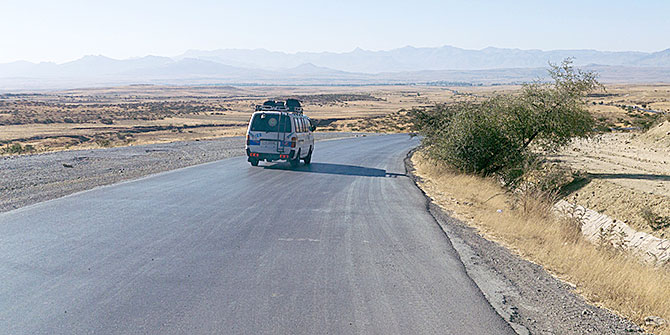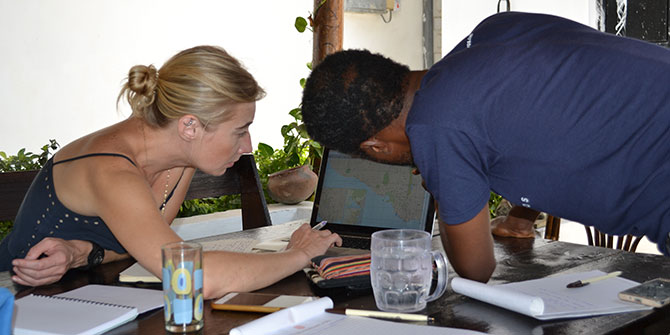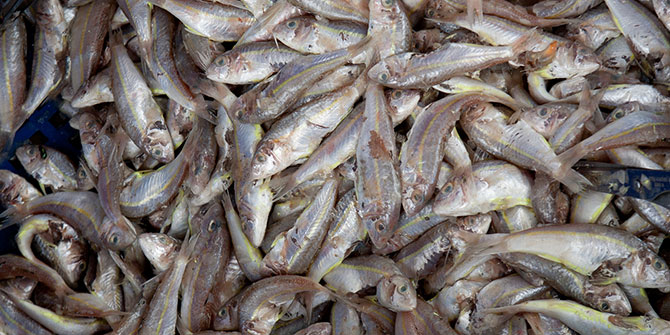Almost a year on from independence, LSE’s Adam Hyde argues that the failure of both South Sudan and Sudan to compromise on oil revenues is pushing both states to the brink of what might become a protracted period of human suffering.
Juba, the capital of South Sudan, is a vastly different city to that of a year ago, when the country was brought into existence as a nation-state on 9 July 2011. Bricks and mortar have replaced mud brick and thatch, and multi-story buildings sprout awkwardly from recently bare ground. Its roads grow busier by the week and those that can stomach the risk are moving in with hotels, bars and other businesses to service the capital.

But the growth that has followed independence has been curtailed by the Government of South Sudan’s (GoSS) decision to shut-off oil production, having been unable to agree with Sudan on the price of transit through the pipelines in Sudan. Without revenue, severe austerity is in place and state salaries are, for the most part, no longer being paid. Terms of trade are not good. The official USD exchange rate (3.18:1) is quite a leap away from the local market rate (5:1) and it’s getting worse. If money were located in banks and not in cattle, a bank run would have caused the economy to melt down by now. Not only is the macro-economic situation dire but also the GoSS is unable to provide security for its citizens and in some cases, it appears not to want to.
It is only through the stubborn resolve of the GoSS, international aid, vibrant regional traders and a legacy of familiarity with impoverishment and conflict that the country is being sustained. The GoSS, perhaps fairly, believes it has nothing to lose by taking the hard line against Sudan. It is an interesting tactic, for Sudan is suffering in the face of significantly reduced national income. The oil supply shock resulting in diminished oil revenues has set in motion a series of political and economic challenges that has resulted in severe austerity, cancellation of oil subsidies and the inability of Khartoum to maintain patronage relationships critical to its own existence.
It is perfectly reasonable that Sudan should be able to charge a reasonable rate for use of its pipeline for South Sudanese oil and it might have been expected that, given its monopoly over the pipeline asset, the rate might be a little high. The South, likewise, can perfectly reasonably not agree to pay that price, which is what they have opted to do by shutting down production altogether. But both sides took an unreasonable position.
The problem with South Sudan’s strategy is that it comes at the expense of many thousands of South Sudanese lives. The discourse around the subject implies that this is Sudan’s fault – those unreasonable Arabs getting in the way of the Southerners who simply want to enjoy unimpeded freedom – and why should the South not enjoy that freedom? They did, after all, fight for decades to achieve it at the cost of millions of lives. What are a few more years worth of lives lost in the scheme of things?
Any life is a lot. Thousands is humanity’s disgrace.
If negotiations were proceeding, even if in some roundabout way, toward a conclusion, one might draw hope and accept the political necessity of treading softly, letting grievances be aired, considered, sympathised with, of crossing the t’s and dotting the i’s. Post-conflict political settlements are, of course, the most fragile of negotiating environments. But recent rounds of negotiations aimed at agreeing a reasonable result on oil revenue sharing, on citizenship, on various other unimplemented aspects of the Comprehensive Peace Agreement (CPA) simply do not even mention these core issues anymore. The most recent rounds of negotiations have almost exclusively discussed the implementation of a demilitarised zone along the border. Media discourse seemed to forget the original point of the negotiations frequently reporting that the negotiations failed to achieve agreement on the demilitarised zone. Huh?
If the situation continues it can be expected that prospects for any kind of peace and stability in South Sudan will diminish exponentially. Without a political settlement, the police and the military will not be paid, terms of trade will deteriorate further, health and education services, already the worst indicators in the world, will diminish in reach and quality, and the hope born of the struggle for independence on the back of those millions of lost lives will be in vain. Violent crime in urban centres, particularly Juba, will increase. Life will simply become a whole lot harder for those for whom life is already the hardest.
Reaching a political settlement would signal that the regime is committed to growth and development more generally and that it can compromise where necessary to save the lives of its citizens. It would be a signal to other governments that South Sudan is a pragmatic regime focused on getting the best it can for its people, even if the best is not great and even if achieving that comes at the price of stubborn pride or perceptions of “just economics”.
Without a settlement, donors’ development programmes will largely go unfunded. No one wants to give support to a regime that, tainted by corruption, will not take the decisions necessary to create the semblance of stability required for its nascent institutions, businesses and community groups to develop and flourish. The perverse incentives to such support are just too great.
For the donor countries, those sitting on the side-lines, as the negotiations do not progress, the same countries that will provide billions of dollars in development aid to South Sudan in coming years, the current situation must be somewhat disappointing. Just when humanitarian aid budgets were going to be complemented and superseded by development programmes aimed at promoting economic growth, things started to fall apart. And after so much hard work.
How should the international community proceed – between stepping in where the government falls down and the risk of perverse incentives and corruption on the one hand, versus the need to provide humanitarian relief and “save lives” and lay the foundations of economic growth on the other? It is not politically viable that DFID, USAID or other major donors continue with their development programmes in the current climate. They are just too risky and outcomes cannot be assured to us tax payers who demand results. Nothing can be done without the GoSS indicating its own will and resolve to achieve a better, inclusive and at least marginally less difficult life for its citizens. The only thing that can be done without that will is to deliver humanitarian aid and provide the cushion if things do fall apart.
More proactively, though, it is time to increase pressure on South Sudan’s leaders, if not Khartoum, to address the issues at the heart of the matter. Perhaps South Sudan should cede to Sudan’s demands on price until such time that it can build an alternative pipeline. Perhaps there are myriad alternative solutions that policy makers and keen observers have flagged but that need support and direction. To start, more nuanced understanding of the incentives facing the Khartoum regime and how they shape its negotiating strategy will benefit the process.
Bringing an end to these negotiations has reached the stage of critical necessity. Without a settlement prospect for peace, security and economic growth will be set back perhaps by decades. South Sudan should do whatever it can to create the conditions for peace and stability so essential if there is to be any chance of economic growth, even if it comes at a higher price than they would ideally pay. To start, the negotiations should be brought back under control and should address the things they are being held to address and not simply provide a running discussion forum for issues emerging in the wake of the failure to reach a political settlement.





